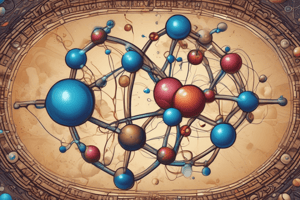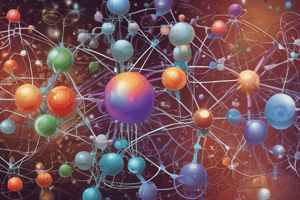Podcast
Questions and Answers
What is the primary assumption about the molecules in the Kinetic Molecular Theory?
What is the primary assumption about the molecules in the Kinetic Molecular Theory?
- They are stationary and do not move.
- They interact with each other constantly.
- They occupy a significant amount of space.
- They are point particles, occupying no space. (correct)
What is directly proportional to the temperature of the system according to the Kinetic Molecular Theory?
What is directly proportional to the temperature of the system according to the Kinetic Molecular Theory?
- The pressure of the system
- The number of molecules in the system
- The volume of the system
- The average kinetic energy of the molecules (correct)
What is the energy associated with the temperature of the system known as?
What is the energy associated with the temperature of the system known as?
- Mechanical energy
- Thermal energy (correct)
- Potential energy
- Kinetic energy
What is the result of the constant motion of the molecules in the Kinetic Molecular Theory?
What is the result of the constant motion of the molecules in the Kinetic Molecular Theory?
What is the force exerted per unit area by the molecules colliding with the walls of the container known as?
What is the force exerted per unit area by the molecules colliding with the walls of the container known as?
What is the significance of the Kinetic Molecular Theory?
What is the significance of the Kinetic Molecular Theory?
What is the main reason for converting units?
What is the main reason for converting units?
What is the conversion factor to convert inches to centimeters?
What is the conversion factor to convert inches to centimeters?
What is the purpose of scientific notation?
What is the purpose of scientific notation?
What is the base unit of length in the SI unit system?
What is the base unit of length in the SI unit system?
How do you multiply two numbers in scientific notation?
How do you multiply two numbers in scientific notation?
How many base units are there in the SI unit system?
How many base units are there in the SI unit system?
Flashcards are hidden until you start studying
Study Notes
Kinetic Molecular Theory
Postulates:
- A gas is composed of a large number of tiny particles called molecules.
- These molecules are in constant random motion.
Assumptions:
- The molecules are point particles, meaning they occupy no space.
- The molecules are in continuous motion, colliding with each other and the walls of the container.
- The collisions are perfectly elastic, meaning no energy is lost.
- The molecules do not interact with each other except during collisions.
- The average kinetic energy of the molecules is directly proportional to the temperature of the system.
Key Concepts:
- Kinetic energy: The energy of motion of the molecules.
- Temperature: A measure of the average kinetic energy of the molecules.
- Pressure: The force exerted per unit area by the molecules colliding with the walls of the container.
- Volume: The amount of space available for the molecules to move.
Implications:
- Gas laws: The theory explains the behavior of ideal gases, including Boyle's law, Charles' law, and Avogadro's law.
- Thermal energy: The energy associated with the temperature of the system.
- Particle motion: The constant motion of the molecules leads to the random distribution of particles in the container.
Importance:
- Understanding gas behavior: The kinetic molecular theory provides a fundamental understanding of the behavior of gases, which is crucial in many fields, including engineering, physics, and chemistry.
- Development of technologies: The theory has led to the development of many technologies, including refrigeration, air conditioning, and gas turbines.
Studying That Suits You
Use AI to generate personalized quizzes and flashcards to suit your learning preferences.



